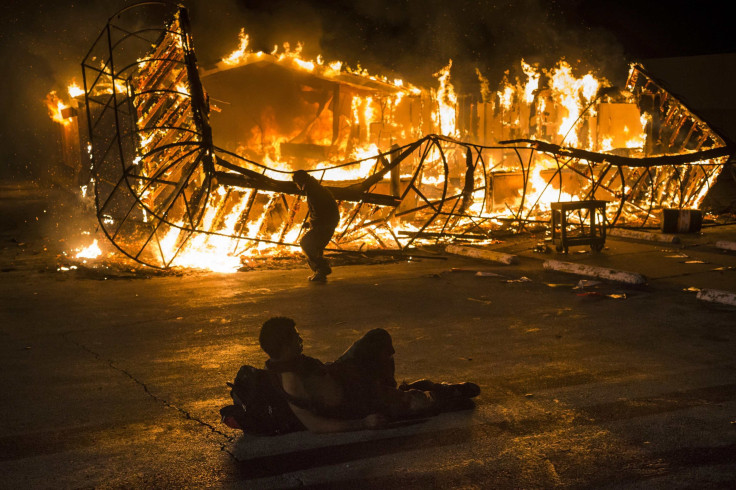Ferguson Protests Force School Closures; Children And Families Seek Other Safe Havens

Following the St. Louis County grand jury’s decision not to indict Police Officer Darren Wilson, families and community leaders in Ferguson, Missouri, are trying to maintain a sense of normalcy amid demonstrations, tear gas, gunshots and burning buildings. Schools were closed Monday and Tuesday in anticipation of the grand jury’s ruling, which left working parents scrambling to find other alternatives for their children. Volunteer teachers, counselors and community leaders in the area are offering meals, counseling, educational support and shelter.
“The safety of our students, staff and campuses will be our top priority,” wrote Lawrence Larrew, acting superintendent for the Ferguson-Florissant School District, in a press release Tuesday.
Ferguson-Florissant and Riverview Gardens school districts are prepared to provide more than 2,000 meals per day across 10 local churches that have pledged to serve as classrooms, meal distribution sites and overall safe havens for children and families while schools are closed. The churches are working with school districts to make sure the sites are open each day schools are not. “Our doors are open. We wouldn’t turn anyone away,” said a Wellspring Church spokesperson, who added the Ferguson church will also host a Thanksgiving meal, with “all the fixings and all the trimmings,” Thursday.
Janet Frain, spokeswoman for Provident, a nonprofit counseling organization in Ferguson funded by United Way of Greater St. Louis, said 20 volunteer counselors at the various sites are offering emotional and mental support for children and families in need. “Most people are disturbed that [the protests] became violent. It’s very anxiety-producing. So it’s really just about calming them and being a really good listener,” Frain said. “It really feels unpredictable. I don’t know what’s going to happen tonight.”
At least a dozen buildings were set on fire and nearly 29 people linked to the protests were arrested in Ferguson Monday night, according to St. Louis County Police Chief Jon Belmar. “What I’ve seen tonight is probably much worse than the worst night that we ever had in August,” Belmar said at a news conference. “There are protesters out here who are out here for the right reason. Tonight, it just didn’t seem that way.”
Demonstrations first overtook the city on Aug. 9 after Wilson shot and killed Michael Brown, an 18-year-old unarmed African-American. Protests escalated amid clouds of tear gas Monday night, after the grand jury announced it would not charge the Ferguson cop in Brown’s death. Belmar said protesters threw rocks and glass bottles at police officers.
Ferguson Municipal Public Library has remained open for families, offering Wi-Fi, computers, books, water and also ad-hoc school for children. Scott Bonner, the library’s director, said dozens of parents dropped their children off at the library on Tuesday, in lieu of classes and after-school programs. “Some parents don’t have jobs where they can just drop a day. It’s really for the parents to let them keep their jobs,” Bonner said, who said the library will provide its facility and resources as long as it’s safe.
Like Frain, Bonner said he was unsure what Tuesday will bring, given the violent community reaction that rocketed Monday night. “It’s so hard to get a read. My read last night was that it was going to be a lot better.”
© Copyright IBTimes 2025. All rights reserved.




















